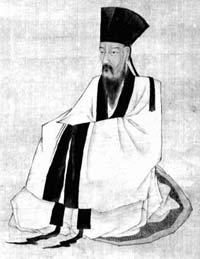
Back Škola Lu-Wang Czech Yangmingisme French 陽明学 Japanese 양명학 Korean Yangmingismen NB 阳明学 WUU 阳明学 Chinese 陽明學 ZH-CLASSICAL

School of the Heart (Chinese: 心學; pinyin: xīn xué), or Yangmingism (Chinese: 陽明學; pinyin: yángmíng xué; Japanese: 陽明学, romanized: yōmeigaku), is one of the major philosophical schools of Neo-Confucianism, based on the ideas of the idealist Neo-Confucian philosopher Wang Shouren (whose pseudonym was Yangming Zi and thus is often referred as Wang Yangming). Throughout the whole Yuan dynasty, as well as in the beginning of the Ming dynasty, the magistral philosophy in China was the Rationalistic School, another Neo-Confucianism school emphasizing the importance of observational science built by Cheng Yi and especially Zhu Xi.[1] Wang Yangming, on the other hand, developed his philosophy as the main intellectual opposition to the Cheng-Zhu School. Yangmingism is considered to be part of the School of Mind established by Lu Jiuyuan, upon whom Yangming drew inspirations. Yangming argued that one can learn the supreme principle (理, pinyin: Li) from their minds, objecting to Cheng and Zhu's belief that one can only seek the supreme principle in the objective world. Furthermore, Yangmingism posits a oneness of action and knowledge in relation to one's concepts of morality. This idea, "regard the inner knowledge and the exterior action as one" (知行合一) is the main tenet in Yangmingism.[2]
It is sometimes called the Lu-Wang school by people who wish to emphasize the influence of Lu Jiuyuan.[3] Xinxue was seen as a rival to the Lixue school sometimes called the Cheng-Zhu school after its leading philosophers, Cheng Yi and Zhu Xi.[3]
Yangming's philosophy was inherited and spread by his disciples. Eventually, Yangmingism overtook the dominance of the Cheng-Zhu School and started to have followers outside China. Yangmingism became an influence on the incipient anti-foreigner movement in 19th century Japan.[4] In the 20th century, Japanese author and nationalist Yukio Mishima examined Yangmingism as an integral part of the ideologies behind the Meiji Restoration as well as further samurai resistance, in particular the Shinpūren rebellion.[5]
Some have described it as influential on the Cultural Revolution for its idea of internal transformation.[6]
- ^ Chan, Wing-Tsit, ed. (1969). A source book in Chinese philosophy (New Impression ed.). New Jersey: Princeton University Press. ISBN 978-1-4008-2003-0. OCLC 859961526.
- ^ "王守仁:始创"知行合一"". 2013-06-25. Archived from the original on 2013-06-25. Retrieved 2020-01-31.
- ^ a b "Xinxue | Chinese philosophy | Britannica".
- ^ Ravina, Mark (2004). The last samurai : the life and battles of Saigō Takamori. Hoboken, N.J.: John Wiley & Sons. ISBN 0-471-08970-2. OCLC 51898842.
- ^ 곽형덕 (2007). "Ma Hae-song and his involvement with Bungei-shunju and Modern-nihon". Journal of Korean Modern Literature (33): 5–34. doi:10.35419/kmlit.2007..33.001. ISSN 1229-9030.
- ^ Theobald, Ulrich. "The School of the Human Mind 心學 (www.chinaknowledge.de)". www.chinaknowledge.de. Retrieved 2023-04-07.
© MMXXIII Rich X Search. We shall prevail. All rights reserved. Rich X Search